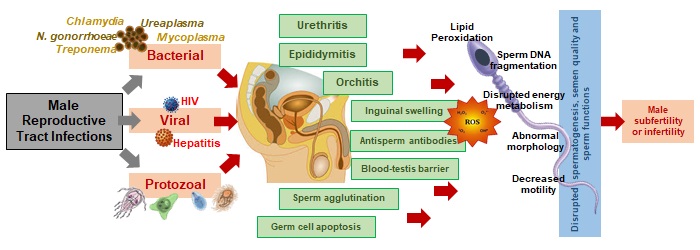
Open Access

Subscription Access
Reproductive tract infection, inflammation and male infertility
Pallav Sengupta, Sulagna Dutta, Ahmed T Alahmar, Urban John Arnold D’souza
Abstract
Infection or inflammation in the reproductive tract either via pathogenic intrusion or systemic diseases, reportedly are closely associated with deterioration in male fertility parameters. There are various proposed mechanisms to explain how reproductive tract infection or inflammation may curb male fecundity. One of the prominent mechanisms is via the over-production of reactive oxygen species (ROS) inducing testicular oxidative stress (OS). In normal conditions, testicular cells produce ROS at modest levels to maintain physiological functions. However, in inflammatory state, the surge of pro-inflammatory mediators, cytokines lead to infiltration of immune cells (as observed by increased seminal leukocytes number) and these leukocytes serve as major contributors in the increased seminal plasma ROS levels that overwhelm the testicular antioxidant capacities. This initiates oxidative damage to the testicular cells to impair sperm production, as well as sperm membrane damage, disruption of essential signalling cascades, sperm mitochondrial and nuclear DNA damage and thereby impairing overall sperm functions. There are number of studies reporting diversified hypothesis of infection/inflammation-induced male reproductive problems. This article aims to review the available information and present a precise overview of possible mechanisms relating male reproductive tract inflammation and male infertility
Keywords
cytokines; infection; inflammation; leukocytes; oxidative stress; semen quality
Full Text:
PDF

ISSN 2347–9825
Authors/visitors are advised to use Firefox browser for better experience of journal site.
Open Access: Researcher from developing/low economy countries can access the jorunal contents through WHO-HINARI .

 ISSN 2347-9825
ISSN 2347-9825

